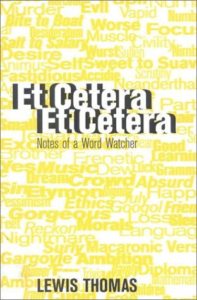 Awhile back, a conversation at Ashlawn Coffee in Old Saybrook brought up the word “blight,” in connection with a new committee in Old Lyme.
Awhile back, a conversation at Ashlawn Coffee in Old Saybrook brought up the word “blight,” in connection with a new committee in Old Lyme.
What, indeed, is “blight”?
Is one person’s “ugly condition” possibly a delight for someone else? That brought up the word “Blighty,” a word referring to England, possibly from Urdu and no connection whatsoever with the word “blight.” So do some words we use infrequently mean the same to all of us?
That question, nagging my brain, led me back to a book I had read almost 30 years ago, Lewis Thomas’s Et Cetera, Et Cetera, in which this medical doctor explores the derivation of many of our common words, with great humor and erudition.. Consider: animus, pessimism, snare, sleep, fastidious, scrutiny, pupil, hair, googol (not Google, I might add!), free, music, ethics, and Gaia.
Fascinating.
From their origins in Indo-European, Greek, Latin, and other languages, to today’s usages, these words have evolved almost as much as we homo Sapiens.
Take, for example, the word “presently.” Some 300 years ago, it was used by the English to mean now or at this moment. Then, in the 18th and 19th centuries in “Old Blighty,” English novelists used it in the sense of the near future. That persisted into the 20th century, but in the last 50 years “presently” seems to have begun to revert to its original sense in many vocabularies.
As Dr. Thomas notes with the word “delight,” “But there is no lasting light in delight; its cognates carry soft warnings of the shadow just ahead.”
His introduction opens our minds to the delight of language: “the mark of being human is speech and the ready use of metaphor, and the evolutionary development of this trait is told, in part, by the history of words … I keep forgetting words. But forgetting is part of the fun, allowing the pleasure of looking them up and being flabbergasted all over again … I turned into an obsessed collector, picking up and storing in the untidy attic of my mind words upon words.”
More salient quotes: “ … something over 90 percent of the remarks made in a day’s turning are essentially idle sounds … indicating presence, politeness, interest if interest is wanted, readiness to talk,” and “ … the immense role played by small-talk in keeping discourse going.” As such, “language is itself the most exhilarating of games, an endless contest in which we are engaged in all our lives, pure fun for the mind.”
Can we as human beings actually learn to live together?
Thomas is cautious about our future: “Right now, because of the noisy triumph of individualism in the last two centuries, and especially because of our collective follies since 1914, we seem to ourselves to have lost the game altogether, on our way to extinction. Good. We will need a few more decades of deep discouragement, casting about for ways to change our behavior toward each other, and then perhaps the notion deep in our collective consciousness will take hold, and we will start changing without realizing that we are transforming ourselves … letting nature, at last, take her course and relying on the language for new guidance.”
His conclusion is a bit more optimistic: we have “a brain capable not only of awareness and what we call consciousness … but we do something more than this. We record the details of our past experience and make compulsive guesses about our future … More than this, and here is our uniquely distinguishing feature, we talk to each other about these things. In short, we are unique because of language. … The really important, far and away most important thing about human beings is human society. We are … a biologically, mandatorily, ineluctably social animal.”
Step back a moment and explore words with Dr. Lewis Thomas, and then go forth and share them with everyone else.
Editor’s Note: ‘Et Cetera, Et Cetera’ was written by Lewis Thomas and published by Little, Brown & Co., Boston 1990.

About the Author: Felix Kloman is a sailor, rower, husband, father, grandfather, retired management consultant and, above all, a curious reader and writer. He’s explored how we as human beings and organizations respond to ever-present uncertainty in two books, ‘Mumpsimus Revisited’ (2005) and ‘The Fantods of Risk’ (2008). A 20-year resident of Lyme, he now writes book reviews, mostly of non-fiction that explores our minds, our behavior, our politics and our history. But he does throw in a novel here and there. For more than 50 years, he’s put together the 17 syllables that comprise haiku, the traditional Japanese poetry, and now serves as the self-appointed “poet laureate” of Ashlawn Farm Coffee, where he may be seen on Friday mornings. His wife, Ann, is also a writer, but of mystery novels, all of which begin in a village in midcoast Maine, strangely reminiscent of the town she and her husband visit every summer.
http://www.oldlyme-ct.gov/Pages/OldLymeCT_Selectmen/Proposed%20Blight%20Ordinance%20011618.pdf